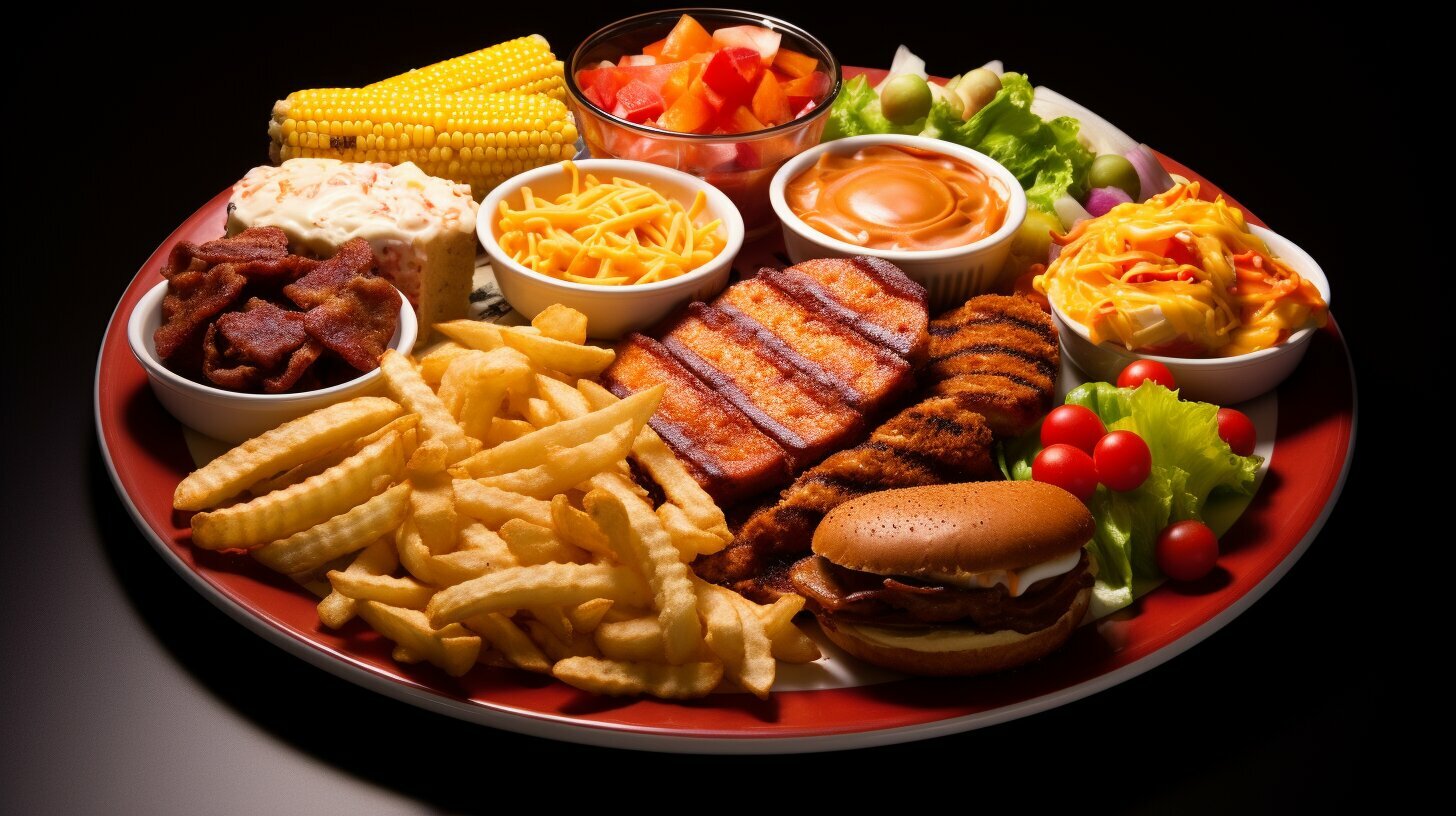What puts on weight fast?
If you’re looking to gain weight quickly and in a healthy way, there are several effective strategies to consider. By incorporating nutrient-dense foods and following a balanced lifestyle, you can achieve your weight gain goals without compromising your health.
Opting for foods that are high in calories and nutrients, such as nuts, dried fruit, high-fat dairy products, meat, and shakes, can help you increase your weight rapidly. However, it’s important to note that consuming unhealthy foods like soda and donuts may lead to initial weight gain but can also increase your risk of heart disease, diabetes, and cancer.
Gaining weight fast and healthy involves prioritizing muscle mass and subcutaneous fat rather than unhealthy belly fat. By focusing on eating nutrient-dense foods, exercising regularly, getting enough sleep, and managing stress, you can safely and effectively put on weight.
Key Takeaways:
- Opt for nutrient-dense foods like nuts, dried fruit, high-fat dairy, meat, and shakes to gain weight rapidly and healthily.
- Avoid consuming unhealthy foods like soda and donuts, as they can increase the risk of heart disease, diabetes, and cancer.
- Focus on gaining a balanced amount of muscle mass and subcutaneous fat, rather than unhealthy belly fat.
- Incorporate regular exercise, sufficient sleep, and stress management into your lifestyle to support healthy weight gain.
- Consult with a healthcare professional or dietitian for personalized guidance on effective weight gain strategies.
Why is gaining weight important?
Being underweight can have serious implications for your health. Whether you are naturally thin or trying to build muscle mass, gaining weight is important for several reasons. Let’s explore why.
Firstly, being underweight can be a result of poor nutrition. If you’re not consuming enough calories or nutrients, your body may not function optimally. Gaining weight means increasing your intake of nutrient-dense foods, which can improve your overall health and well-being.
Secondly, being underweight is associated with various health problems. It can weaken your immune system, making you more susceptible to infections. It can also increase your risk of osteoporosis and fractures, as well as fertility problems. In severe cases, being underweight can even lead to sarcopenia, dementia, and other complications.
In a society where there is often a focus on losing weight, it’s important to remember that being underweight can have serious health consequences.
Lastly, gaining weight can help you achieve a balanced body composition. It’s not just about gaining fat; it’s about gaining muscle mass and subcutaneous fat in a healthy way. This can enhance your physical strength, improve your body’s metabolism, and support overall well-being.
Overall, whether you are underweight or simply looking to build muscle mass, gaining weight is important for your health and overall well-being. It’s about providing your body with the necessary nutrients and achieving a balanced body composition. Remember to consult with a healthcare professional or a registered dietitian for personalized guidance on safe and effective weight gain strategies.

Reasons for wanting to gain weight:
- Improving overall health and nutrition
- Increasing muscle mass and strength
- Enhancing body composition
- Reducing the risk of various health problems
- Achieving a balanced and healthy lifestyle
Health problems associated with being underweight:
- Osteoporosis and fractures
- Compromised immune function
- Fertility problems
- Sarcopenia and muscle wasting
- Dementia and cognitive decline
Gaining weight in a healthy way involves focusing on nutrient-dense foods, regular exercise, and overall lifestyle changes. It’s about nourishing your body and promoting optimal health.
| Reasons for Wanting to Gain Weight: | Health Problems Associated with Being Underweight: |
|---|---|
| Improving overall health and nutrition | Osteoporosis and fractures |
| Increasing muscle mass and strength | Compromised immune function |
| Enhancing body composition | Fertility problems |
| Reducing the risk of various health problems | Sarcopenia and muscle wasting |
| Achieving a balanced and healthy lifestyle | Dementia and cognitive decline |
Health risks linked to being underweight
Being underweight can have serious consequences for your health. It is associated with an increased risk of death, impaired immune function, osteoporosis, fractures, fertility problems, sarcopenia, dementia, and growth and development problems in children.
Studies have found that clinically underweight individuals have a higher risk of death compared to individuals with obesity. Being underweight can weaken your immune system, making you more susceptible to infections and illnesses. It can also lead to bone loss and increase the risk of osteoporosis and fractures.
Furthermore, being underweight can affect reproductive health. It can cause fertility problems in both men and women and can affect hormonal balance. In older adults, being underweight is associated with sarcopenia, a loss of muscle mass and strength, which can impact overall mobility and quality of life. Additionally, there is evidence suggesting a link between being underweight and dementia in older adults.
“Being underweight can have serious health consequences, including an increased risk of death and impaired immune function.” – Health Magazine
| Health Risks | Consequences |
|---|---|
| Osteoporosis and fractures | Weakening of the bones, increased risk of fractures |
| Fertility problems | Difficulties conceiving, hormonal imbalances |
| Sarcopenia | Loss of muscle mass and strength |
| Dementia | Increased risk of cognitive decline and memory loss |
If you are underweight, it is important to address this issue and take steps to achieve a healthier weight. Consulting with a healthcare professional or registered dietitian can provide personalized guidance on the best approach for you. They can help you develop a balanced eating plan, ensuring you consume enough calories and nutrients to support your overall health and well-being.
Causes of Being Underweight
Being underweight can be attributed to various factors, including medical conditions and lifestyle choices. Here are some common causes of being underweight:
Eating Disorders
Eating disorders such as anorexia nervosa can lead to severe weight loss and being underweight. These disorders involve distorted perceptions of body image and an intense fear of gaining weight.
Thyroid Problems
Thyroid problems, particularly hyperthyroidism, can accelerate metabolism and result in weight loss. This condition causes the thyroid gland to produce excessive amounts of thyroid hormones, affecting the body’s ability to maintain a healthy weight.
Celiac Disease
Celiac disease is an autoimmune disorder that affects the small intestine. People with celiac disease have an adverse reaction to gluten, which damages the lining of the small intestine and impairs nutrient absorption. This can lead to malnutrition and weight loss.
Diabetes
Uncontrolled diabetes, specifically type 1 diabetes, can cause weight loss and being underweight. Insufficient insulin production in type 1 diabetes leads to the breakdown of muscle and fat for energy, resulting in weight loss.
Cancer
Certain types of cancer can cause weight loss and being underweight. Cancerous cells consume a significant amount of the body’s energy and nutrients, leading to a decline in overall weight.
Infections
Severe infections, such as tuberculosis and HIV, can cause weight loss and being underweight. These infections can affect the body’s ability to absorb nutrients, leading to significant weight loss over time.
It is important to note that being underweight can have serious implications for overall health and well-being. If you or someone you know is underweight, it is crucial to consult with a healthcare professional to determine the underlying cause and develop an appropriate treatment plan.
Different strategies for gaining weight
To effectively gain weight, it is important to adopt various strategies that focus on creating a calorie surplus, increasing protein intake, and incorporating energy-dense foods into your diet. These strategies will help you achieve your weight gain goals in a healthy and sustainable manner.
Creating a calorie surplus
One of the key strategies for gaining weight is to create a calorie surplus. This means consuming more calories than your body needs. To determine your daily calorie needs, you can use a calorie calculator. Aim to consume an additional 300-500 calories above your maintenance level for slow and steady weight gain, or 700-1000 calories for faster weight gain. Remember, these figures are estimates, and individual needs may vary.
Increasing protein intake
Protein is crucial for muscle growth and repair. To support weight gain, it’s important to increase your protein intake. Aim to consume high-quality protein sources such as lean meats, poultry, fish, eggs, legumes, nuts, and dairy products. Protein supplements like whey protein can also be helpful if it is difficult to meet your protein needs through food alone. Consult with a healthcare professional before making any significant changes to your protein intake.
Increasing intake of carbs and fat
Carbohydrates and fat are important sources of energy and can aid in weight gain. Include healthy sources of carbohydrates such as whole grains, fruits, and vegetables in your diet. Incorporate foods rich in healthy fats like avocados, nuts, and seeds. Strive for a balanced intake of both carbs and fat to ensure optimal calorie consumption for weight gain.
Eating energy-dense foods
Incorporating energy-dense foods into your diet can provide additional calories without increasing the volume of food consumed. These foods are typically high in nutrients and calories, making them an effective choice for weight gain. Examples include nuts, dried fruit, whole-fat dairy products, oils, and grains. However, it’s important to strike a balance and ensure that these foods are consumed alongside a variety of nutrient-dense whole foods.

By implementing these strategies, you can create a conducive environment for healthy weight gain. Remember to listen to your body, make gradual changes, and consult with a healthcare professional or registered dietitian for personalized guidance. Building a positive relationship with food and maintaining an overall healthy lifestyle will contribute to successful weight gain.
Increase your caloric intake
When it comes to gaining weight, one of the key strategies is to increase your caloric intake. This involves consuming more calories than your body needs, creating a calorie surplus that promotes weight gain. To determine the appropriate number of calories to consume, you can use a calorie calculator. This tool estimates your daily caloric needs based on factors like age, gender, weight, height, and activity level.
To gain weight slowly and steadily, aim for a calorie surplus of 300-500 calories above your maintenance level. This approach allows for gradual weight gain without excessive fat accumulation. However, if you’re looking to gain weight quickly, you may need to increase your caloric intake by 700-1000 calories above your maintenance level. It’s important to note that these calorie estimates are general guidelines, and individual needs may vary.
When increasing your caloric intake, focus on consuming nutrient-dense foods that provide a wide range of essential nutrients. This ensures that your weight gain is accompanied by overall health and wellbeing. Opt for whole grains, lean proteins, fruits, vegetables, and healthy fats. Avoid relying solely on high-calorie, low-nutrient foods, as they can contribute to weight gain but may not support optimal health.

It’s also important to consider the quality of the calories you consume. While it’s tempting to rely on sugary snacks and fast food for quick calorie boosts, these choices can lead to unhealthy weight gain and increase the risk of chronic diseases. Instead, focus on incorporating nutrient-dense foods into your daily diet. These include lean proteins, whole grains, fruits, vegetables, nuts, and seeds. By increasing your caloric intake with these healthy options, you can support your weight gain journey while maintaining overall health.
Increase your protein intake
Adequate consumption of high-quality proteins is essential for optimal growth and muscle health. Protein is crucial for various bodily functions, including building and repairing tissues, supporting immune function, and producing enzymes and hormones. To ensure you are getting enough protein, it is important to increase your protein intake through your diet.
The Recommended Dietary Allowance (RDA) of protein for healthy adults is between 1 to 1.6 grams per kilogram of body weight per day. This means that, on average, a sedentary adult woman needs about 46 grams of protein per day, while a sedentary adult man needs about 56 grams of protein per day. However, athletes, pregnant and breastfeeding women, and individuals recovering from injuries may require higher protein intake.
Protein can be obtained from a variety of sources, including animal and plant-based foods. Some examples of high-quality protein sources include lean meats, poultry, fish, eggs, dairy products, legumes, and nuts. Whey protein supplements can also be a convenient option if it is difficult to meet your protein needs through diet alone. However, it is important to consult with a healthcare professional or registered dietitian before increasing protein intake or using supplements.
| Protein Source | Protein Content (per 100g) |
|---|---|
| Chicken Breast | 31g |
| Greek Yogurt | 10g |
| Quinoa | 14g |
| Eggs | 13g |
| Salmon | 22g |
Benefits of increasing your protein intake:
- Promotes muscle growth and repair: Protein provides the essential amino acids needed for muscle protein synthesis, which is essential for muscle growth and repair.
- Increases satiety: Protein-rich foods can help you feel fuller for longer, reducing the likelihood of overeating and supporting weight management.
- Supports immune function: Protein plays a crucial role in the production of antibodies and other immune cells, helping to support a healthy immune system.
- Aids in weight management: High protein diets have been shown to increase metabolism and reduce appetite, which can assist in weight loss or maintenance.
Increasing your protein intake can have numerous benefits for overall health and muscle growth. By incorporating high-quality proteins into your diet and meeting your recommended protein requirements, you can support your weight gain goals and enhance your overall well-being.

Increase your intake of carbs and fat
When it comes to gaining weight, it’s essential to increase your intake of both carbohydrates and fats. These macronutrients provide the necessary calories for weight gain and can help you achieve your weight gain goals. Including high carb and high-fat foods in your diet can ensure that you’re consuming enough calories to create a calorie surplus.
Some examples of high carb foods include whole grains, pasta, rice, potatoes, and legumes. These foods are rich in carbohydrates and can provide a significant amount of energy. Additionally, incorporating healthy fats into your diet is important for weight gain. Avocados, nuts and seeds, olive oil, and fatty fish like salmon are excellent sources of healthy fats that can contribute to your overall calorie intake.
It’s important to note that while increasing your intake of carbs and fats is crucial for weight gain, it’s essential to choose healthy options. Opt for whole foods like fruits, vegetables, whole grains, and lean proteins to ensure you’re getting the necessary nutrients along with the additional calories. Avoiding highly processed and sugary foods will help you gain weight in a healthy way.
| High Carb Foods | Healthy Fat Sources |
|---|---|
| Whole grains (oats, quinoa, brown rice) | Avocado |
| Pasta | Nuts and seeds |
| Rice | Olive oil |
| Potatoes | Fatty fish (salmon, tuna) |
| Legumes (beans, lentils) | Coconut oil |
Incorporating these foods into your meals and snacks can help you increase your intake of carbs and fats. It’s also a good idea to follow a meal plan that includes regular meals and energy-dense snacks. This can ensure that you’re consistently consuming enough calories throughout the day to support weight gain.

Energy-Dense Snacks:
- Nuts and nut butter
- Dried fruit
- Granola bars
- Trail mix
- Energy balls
- Cheese and crackers
- Avocado toast
Including energy-dense snacks can be a convenient way to increase your calorie intake without feeling overly full. These snacks are usually high in both carbohydrates and fats, making them an excellent choice for those looking to gain weight.
Increase your intake of energy-dense foods
When it comes to gaining weight, increasing your intake of energy-dense foods is key. These foods are packed with calories relative to their weight, making it easier to consume more calories and create a calorie surplus. While it’s important to prioritize whole foods for overall health, incorporating energy-dense foods into your diet can help you reach your weight gain goals.
One way to make your meals more energy-dense is by adding spices, sauces, and condiments. These not only enhance the flavor of your dishes but also add extra calories. Consider incorporating ingredients like olive oil, mayonnaise, peanut butter, and avocado into your meals to increase their calorie content. These additions can make your meals more enjoyable and help you consume more calories.
To further increase your calorie intake, include energy-dense foods in your diet. Some examples of energy-dense foods include nuts, dried fruit, high-fat dairy products, fats and oils, grains, meat, tubers, and others. These foods provide a concentrated source of calories and nutrients. Incorporating a variety of energy-dense foods can help you meet your daily calorie needs and support healthy weight gain.

Energy-Dense Foods List
| Foods | Calories per 100g |
|---|---|
| Nuts (almonds, walnuts, peanuts) | 500-600 |
| Dried fruit (raisins, dates, prunes) | 250-350 |
| High-fat dairy products (cheese, full-fat yogurt) | 300-400 |
| Fats and oils (olive oil, coconut oil, butter) | 900-9000 |
| Grains (quinoa, rice, oats) | 350-400 |
| Meat (beef, pork, chicken) | 200-300 |
| Tubers (potatoes, sweet potatoes) | 100-200 |
By incorporating energy-dense foods and adding extra calories to your meals, you can increase your overall calorie intake and support healthy weight gain. Remember to focus on eating a balanced diet that includes a variety of nutrient-dense foods, exercise regularly, get enough sleep, and manage stress to support your overall health and well-being.
Conclusion
In summary, gaining weight healthily is crucial for individuals who are underweight or want to build muscle mass. By following a balanced diet and incorporating specific strategies, it is possible to achieve safe and effective weight gain.
Firstly, creating a calorie surplus by increasing caloric intake is essential. By consuming more calories than your body burns, you can provide the necessary energy for weight gain. Additionally, focusing on nutrient-dense foods ensures that you gain weight in a healthy manner, avoiding excessive belly fat.
Furthermore, increasing protein intake is important for muscle growth and development. By consuming high-quality protein sources, such as meats, fish, legumes, and dairy products, you can support optimal muscle health.
Lastly, incorporating energy-dense foods, such as nuts, dried fruit, high-fat dairy, and whole grains, can help you meet your calorie goals. These foods provide more calories relative to their weight, making it easier to consume the necessary amount for weight gain.
In conclusion, by following these strategies and living an overall healthy lifestyle that includes exercise, adequate sleep, and stress reduction, you can achieve safe and effective weight gain. It is advisable to consult with a healthcare professional or dietitian for personalized guidance throughout your weight gain journey.
FAQ
What puts on weight fast?
Consuming nutrient-dense foods and beverages, like nuts, dried fruit, high-fat dairy products, meat, and shakes, can help you gain weight quickly. However, it’s important to prioritize healthy options and avoid junk foods like soda and donuts, which can increase the risk of heart disease, diabetes, and cancer.
Why is gaining weight important?
Gaining weight is important for individuals who are underweight or want to build muscle mass. Being underweight can increase the risk of various health problems, such as osteoporosis, infections, fertility problems, and early death.
What are the health risks linked to being underweight?
Being underweight can have serious health consequences, including impaired immune function, increased risk of infection, osteoporosis, fractures, fertility problems, sarcopenia, and dementia. In children, it can also affect growth and development.
What are the causes of being underweight?
Several medical conditions can cause weight loss and being underweight, such as eating disorders, thyroid problems, celiac disease, uncontrolled diabetes, cancer, and certain infections like tuberculosis and HIV.
What are the different strategies for gaining weight?
Different strategies for gaining weight include creating a calorie surplus, increasing protein intake, increasing intake of carbs and fat, and eating energy-dense foods.
How can I increase my caloric intake?
You can increase your caloric intake by eating more calories than your body burns. This can be determined using a calorie calculator to estimate your calorie needs. To gain weight slowly and steadily, aim for 300-500 calories more than your maintenance level, and for fast weight gain, aim for 700-1000 calories above your maintenance level.
How can I increase my protein intake?
Increasing protein intake is crucial for muscle growth. You can increase your protein intake by consuming high-quality protein sources such as meats, fish, eggs, legumes, nuts, and dairy products. Protein supplements like whey protein can also be useful if it’s difficult to get enough protein through diet alone.
How can I increase my intake of carbs and fat?
To increase your intake of carbs and fat, it’s important to consume high carb and high-fat foods. Eating at least three meals per day and adding energy-dense snacks whenever possible can help increase calorie intake. Avoiding eating plans like intermittent fasting can also help in consuming enough calories for weight gain.
How can I increase my intake of energy-dense foods?
While it’s important to eat mostly whole foods for overall health, when trying to gain weight, it may be necessary to consume energy-dense foods that provide more calories relative to their weight. Adding spices, sauces, and condiments to meals can make them tastier and easier to eat in larger quantities. Examples of energy-dense foods include nuts, dried fruit, high-fat dairy, fats and oils, grains, meat, and tubers.
What is the conclusion?
Gaining weight healthily involves creating a calorie surplus, increasing protein intake, consuming energy-dense foods, and following an overall healthy lifestyle. It’s important to prioritize nutrient-dense foods and consult with a healthcare professional or dietitian for personalized guidance.






